Aseem Chhabra in New York
In British director Sacha Gervasi's film Hitchcock, Anthony Hopkins -- in yet another career-defining role -- plays the legendary director when he was in his late 50s and set to direct his biggest success Psycho.
The film not only focuses on the struggles Alfred Hitchcock had to go through to make the film -- the studio would not finance it, since they found it too racy and so the director mortgaged his house in Los Angeles -- but also the pressures it brought on his marriage with his wife and working partner Alma (a terrific Oscar worthy performance by Helen Mirren).
In addition to Hopkins and Mirren, Hitchcock also stars Toni Collette (as Hitchcock's assistant Peggy), Scarlett Johansson (Janet Leigh) and Jessica Biel (Vera Miles).
Hopkins discussed the film at a New York press conference, via satellite, and talked about how he became Hitchcock for the film, his passion for the filmmaker and his own insecurities. Excerpts from the press conference:
On wearing the fat suit and the challenges of playing Alfred Hitchcock
Hitchcock was such an immense figure, physically and also in his stature and reputation as one of the greatest filmmaker of the century.
I was a fan of Hitchcock ever since I was a young boy. I was 16 when I saw Rear Window and later the other ones like North by Northwest. Vertigo is one of my favourites.
Psycho released in September 1960 and I watched it in Manchester. I was knocked out by the power of the film. In those days, watching a Hitchcock movie in England was an event.
My insecurities started after filming Hitchcock. I caught a sight of myself on those video playbacks and I didn't want to see anymore because I wasn't sure if I had gotten it right.
But I saw the entire film about four weeks ago. Sacha has done a remarkable job and I was very pleased with what I saw.
I had studied many of Hitchcock mannerism on the TV series. I watched his films -- the early silent movies, and Psycho, Vertigo again and again.
He was born and brought up in Leytonstone in East London so he was a Cockney. The accent he put on for the shows when he became known as the great Alfred Hitchcock was for the benefit of the American audiences, when he would say 'Good Evening. I have a story which would terrify you.' (he does the Hitchcock accent). I know I had to get the voice as close as possible.
'Hitchcock was a very guarded man, very shy and didn't show much emotions'
Image: Anthony Hopkins as Alfred HitchcockIt was quite astonishing how they had designed the suit so I could feel like Hitchcock. The make-up and the big fat suit certainly helped me.
I had done my homework, read the script obsessively as I tend to do. I made sure that I was secure with the vocal technique as much as possible.
Hitchcock was a very guarded man, very shy and didn't show much emotions. It must have amused him too. He knew there were naysayers and they would come around. But he didn't have a mean bone in his body.
I met a PR person who told me that Hitchcock was very good at publicity. When Psycho opened in New Jersey, they had to bring in the police to stop people from getting into the theatres. It was a joke, but Hitchcock built up the tension.
Janet Leigh said that he was the most fun director she'd ever worked with. She and Tony Curtis would go to his house, and he would have them laughing with his wicked sense of humour. He also played practical jokes on people.
'I met Hitchcock in 1979 in a restaurant'
Image: Scarlett Johansson, Anthony Hopkins and Helen Mirren in HitchcockI met Hitchcock in a restaurant in Los Angeles.
It was called Ma Maison, and I was with my agent, who actually represented Alfred Hitchcock, Marilyn Monroe and Montgomery Clift. His name was George Chasen.
It was 1979 and Hitchcock had just been made a knight by the Queen. So I said I would love to meet him. We walked up to his table and George Chasen said, 'Good afternoon, Sir Alfred.'
I was introduced to him as George's client and he said, 'Charmed, I'm sure.' That was the only time I met him.
I met Janet Leigh a few times, and I asked her about Hitchcock. I met James Stewart over 30 years ago, and I asked him what it was like working with Hitchcock, and he gave me some insights. I had no idea that I would play him on screen later, but I'm glad I did.
'Hitchcock used to say, 'Always the bridesmaid never the bride''
Image: Alfred Hitchcock with James StewartPhotographs: Baron/Getty Images
I think he adapted very well in Hollywood. He loved it there. He enjoyed his life there. He was a real hedonist. He loved food, good wine, his entire lifestyle. He loved California.
His great genius was that he was a psychologist. He understood human psychology so deeply. He was also a well-read man. He spoke a number of languages.
He had a natural hunger for knowledge. He mentioned somewhere that he read Freud deeply. So he had a knowledge of human nature and the dark forces that are in every human being.
People are very fond of using the words 'the dark side.' I don't think he had a dark side. He was complex, probably a very insecure man. When he was never nominated for an Oscar, he said, 'Always the bridesmaid, never the bride.'
When word got out that he wanted to do this schlock horror movie called Psycho, they thought he was mad. He probably thought he was mad too, but he mortgaged his house and put his life, his security at risk. It was because of Alma, who encouraged him and was an ally, and he never really thanked her until the final Lifetime Achievement award from the American Film Institute in 1979.
'Hitchcock had this wonderful sense of what is real'
Image: Alfred HitchcockPhotographs: Keystone/Getty Images
I think what was really powerful about Hitchcock is the way he created an atmosphere in a scene. For instance, the scene in Vertigo where James Stewart goes to Barbara Bel Geddes' apartment.
The way the room is lit, the furniture in the room. Hitchcock had this wonderful sense of what is real.
Similarly, in Pyscho the office where Janet Leigh worked gives you a very claustrophobic, dark feeling. You just sense that something is not quite okay.
Hitchcock said in an interview what fascinated him about life was the unpredictable. He felt he always had to be in control, because he was always terrified of the unexpected. And that's what he would do in his films. He would make you feel uneasy.
Hitchcock's obsession was that you wake up in the morning, say your prayers if you are a believer and you go about your business. And suddenly life is changed like the turn on the dime.
Once when he was on the Dick Cavett show he was asked what frightened him and he said (again in Hitchcock's voice) 'Policemen frighten me, because when I was a boy I did something naughty and I was put in a police cell by my father.'
The way he designed his shots was remarkable.
He told Tony Perkins (in Psycho) 'You don't want to worry about what the motivation is. My camera will tell you what to do.' He gave his actors the freedom to speak their lines, but they should stay within the frame of the camera.
'Critics destroyed Vertigo when it released but it's a top movie today'
Image: Janes Stewart and Kim Novak in VertigoFrom Bernard Herrmann's haunting score to James Stewart's romantic obsession for this young woman who is a mystery, everything is impressive about Vertigo.
Critics destroyed it when it first came out and now it has become the top film of all time -- top movie above Casablanca and Citizen Kane. So the genius lives on many years after his death.
I felt very honoured to play him and I was very nervous, because I felt I couldn't do justice to the character. I was very moved because I was given the part to play. It had a profound effect on me.

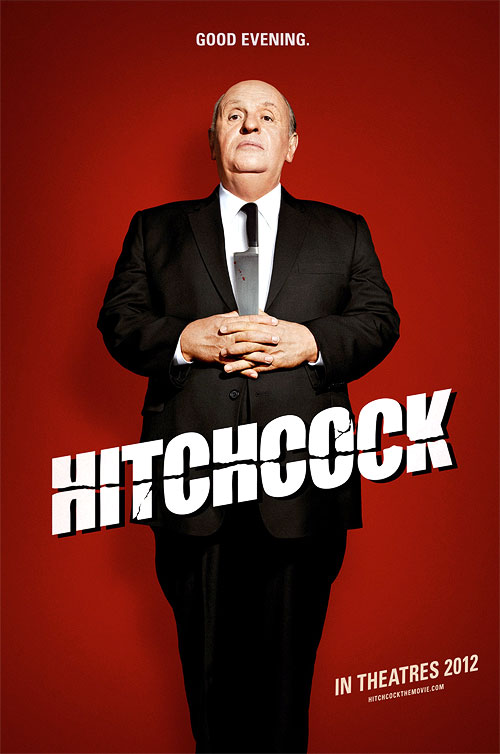
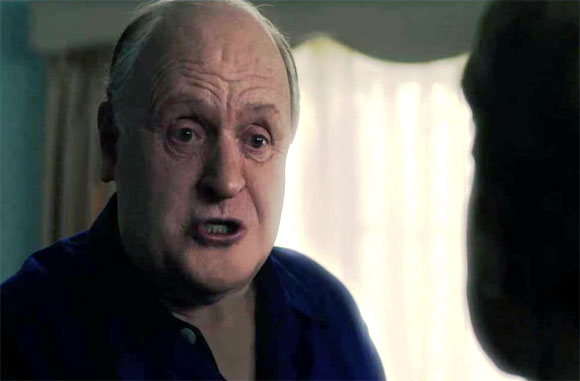
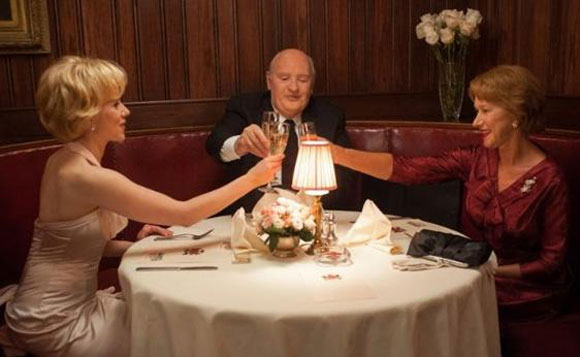
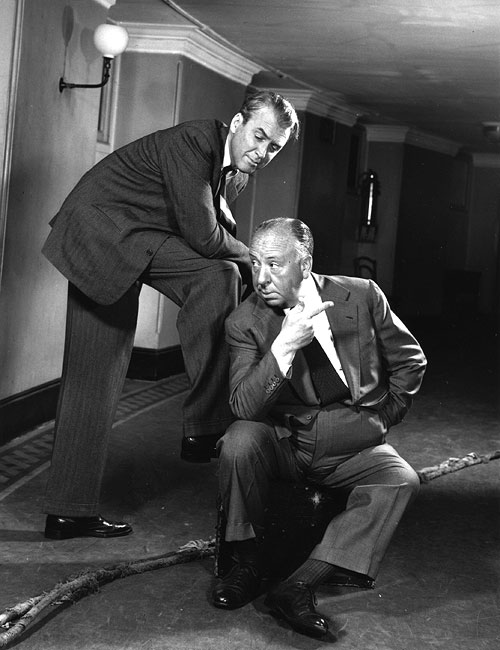
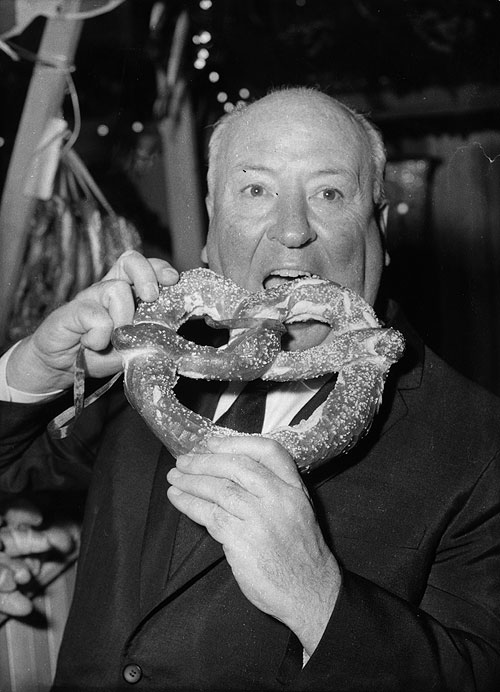
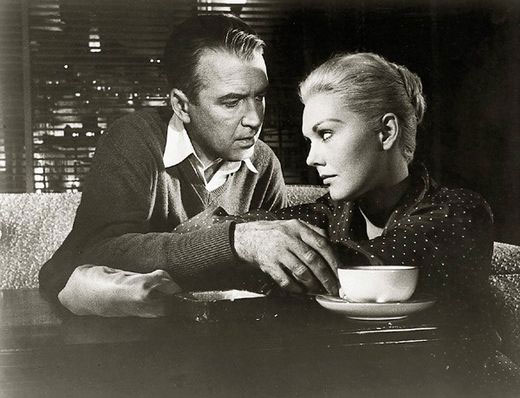
Comment
article